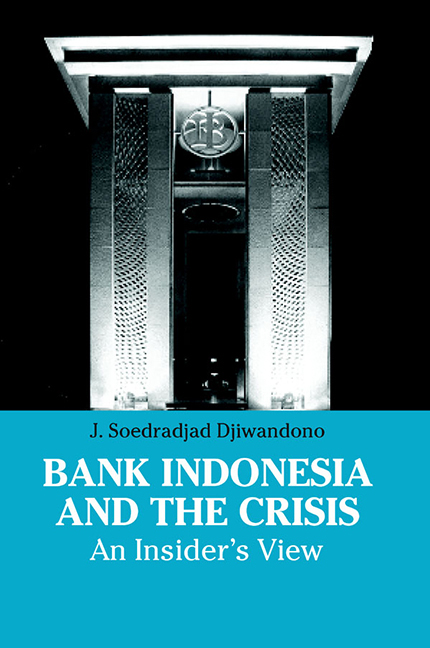Book contents
- Frontmatter
- Dedication
- Contents
- List of Tables
- Acknowledgements
- Glossary
- Prologue: The Crisis and Me
- 1 Introduction
- 2 Origin of the Crisis and Early Responses
- 3 Stabilization and Reform Programmes
- 4 Poor Programme Implementation
- 5 Stronger Programme with Weak Commitment
- 6 Bank Indonesia and the Crisis
- 7 Lessons from the Crisis
- 8 Epilogue
- Postscript
- Notes
- References
- Index
- About the Author
5 - Stronger Programme with Weak Commitment
Published online by Cambridge University Press: 21 October 2015
- Frontmatter
- Dedication
- Contents
- List of Tables
- Acknowledgements
- Glossary
- Prologue: The Crisis and Me
- 1 Introduction
- 2 Origin of the Crisis and Early Responses
- 3 Stabilization and Reform Programmes
- 4 Poor Programme Implementation
- 5 Stronger Programme with Weak Commitment
- 6 Bank Indonesia and the Crisis
- 7 Lessons from the Crisis
- 8 Epilogue
- Postscript
- Notes
- References
- Index
- About the Author
Summary
First Review
Confronted with deteriorating economic, financial and banking conditions towards the end of 1997 and beginning of 1998, the government undertook a variety of adjustment steps. But since the programme was part of the agreement with the Fund in a stand-by arrangement, a review to evaluate the implementation of the programme, including compliance to performance criteria and other conditionality as stipulated in the first letter of intent, had to be conducted.
The evaluation of programme implementation would determine whether a drawing from the loan could be made. The evaluation was also needed to determine any other changes or additional steps that should be included in the adjustment programme.
The second LOI was negotiated directly by President Soeharto with the Fund team. The new programme of financial restructuring and economic reform was basically an enhanced and improved programme of the one contained in the first LOI. President Soeharto himself signed the second LOI on 15 January 1998. The President's direct involvement was an extraordinary step.
In the IMF's review of 7 January 1998 it was stated that “performance under the programme so far has been decidedly disappointing.” It was further stated that “although some progress has been made, there have also been policy slippages in every area of the programme.” In particular, it was noted that the interest rates finally being raised would not be sustainable due to pressures from government officials who demanded the lowering of rates. The promise to produce a budget surplus also seemed to be remote. Most troubling, in the Fund's evaluation, was that the authorities had taken a number of structural steps backward, especially in governance.
The review noted further that as a result of the policy performance, hard-won market confidence, built up over three decades of rapid economic progress, and revived at the outset of the arrangement, had vanished. The development had prompted the collapse of the exchange rate.
- Type
- Chapter
- Information
- Bank Indonesia and the CrisisAn Insider's View, pp. 142 - 164Publisher: ISEAS–Yusof Ishak InstitutePrint publication year: 2005

